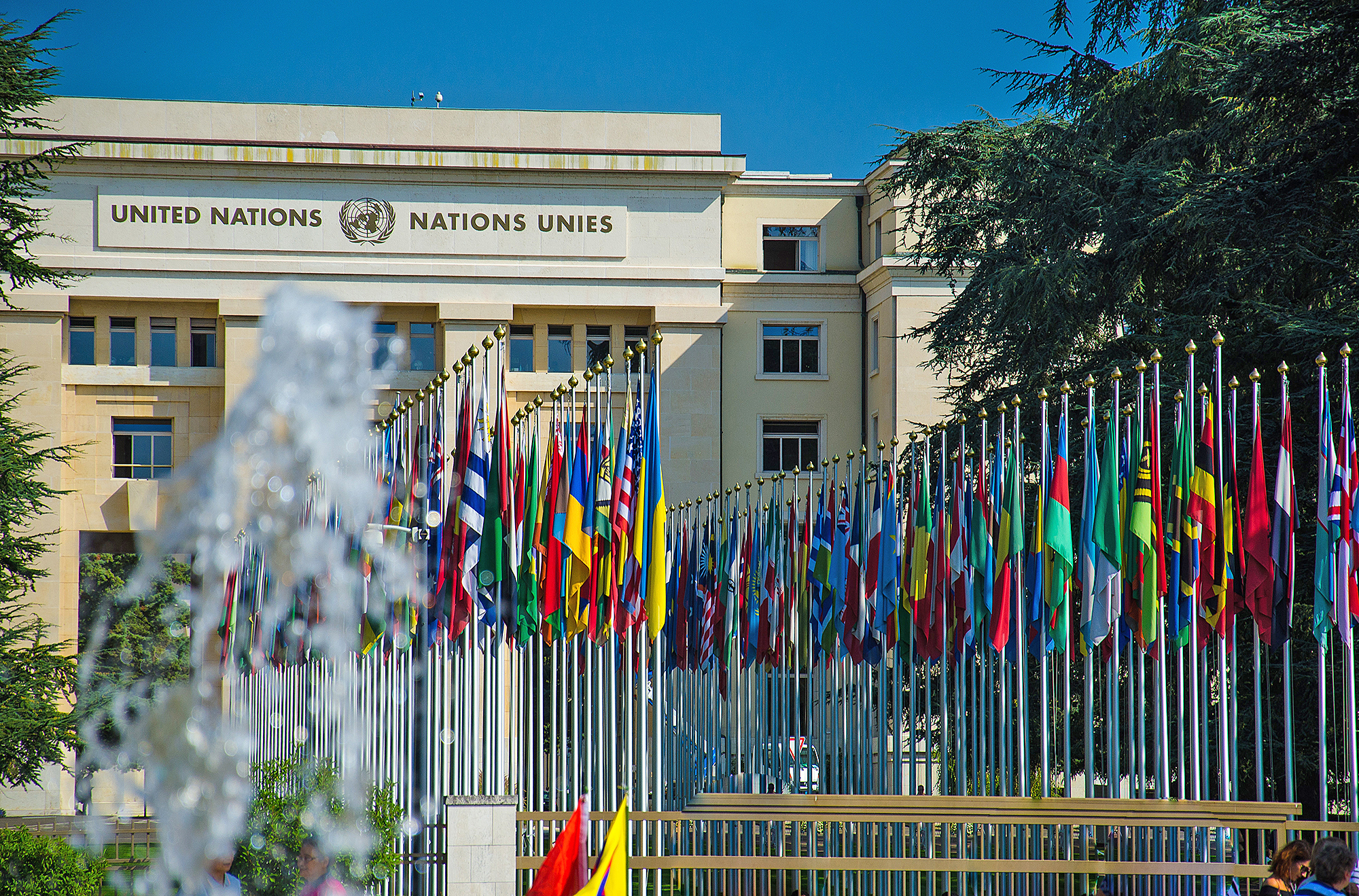Global conscience: On the dispute over the effectiveness of international law and the possible role of religions
ISLAMC TIMES – It is the night before Palm Sunday in Lübeck, 29 March 1942. In retaliation for the destruction of Coventry, the British launch their first aerial attack on a German city centre. A total of 320 people were killed in this carpet bombing of a major city, between 15,000 and 30,000 people were left homeless and more than 3,000 buildings were destroyed or severely damaged.
In exile in America, the writer Thomas Mann, who made the city world-famous with his novel Buddenbrooks, watched the events unfold in his hometown. His grandparents’ house was hit and severely damaged in the attack. In a radio address, he shared his assessment: “[…] And I do not like to think that St. Mary’s Church, the magnificent Renaissance town hall or the Schiffergesellschaft building may have suffered damage.‘ He lamented the destruction of buildings and cultural assets without mentioning the approximately 330 civilians who did not survive the attack.
In April 1942, he added in the BBC programme Deutsche Hörer! (German listeners!): ‘But I think of Coventry and have no objection to the lesson that everything must be paid for. There will be more people in Lübeck, Hamburg, Cologne and Düsseldorf who will have no objection to this. And when they hear the roar of the Royal Air Force above their heads, they will wish them every success.’
The global conscience or ethical standards
The ethical standards of the writer, which are clear here, can be explained by the unambiguous historical situation and his contempt for the inhuman policies of the National Socialists, who dragged Europe into the abyss with their wars of aggression. Added to this is the shock of the persecution of the Jews and the Holocaust. The fascist regime had to be overthrown. Mann leaves no room for doubt: ‘Hitler had the great advantage of simplifying emotions, of eliciting an unquestioning “no”, a clear and deadly hatred. The fight against him was a morally good time.’
Let’s not kid ourselves: historical comparisons that seek to equate current wars with the fight against National Socialism usually lead us down a slippery slope. In the interest of justifying their own wars of aggression, people are quick to assert a moral clarity that does not stand up to a closer analysis of the background to the armed conflicts of our time. From a military point of view, it is objectively clear that the Russian government is waging a war of aggression against Ukraine and that Israel and the United States have attacked Iran.
On a moral level, no reasonable person would welcome the realisation of fantasies that dream of the complete annihilation of others. Nevertheless, our times are characterised by ambiguity, a multitude of perspectives, experiences and historical developments that make simple moral judgements, as Thomas Mann was able to make in a different situation, difficult. It is good that we continually re-examine our moral standards.
Profound shifts in the present
Amid geopolitical tensions, social division and global crises, a profound shift is taking place today: the major coordinate systems of our coexistence – law, morality, truth – that were once considered stable are now faltering. What used to be considered a non-partisan foundation is increasingly being used as a political weapon. And with the ongoing erosion of this order, the question becomes more urgent: what holds the international community together?
A look at the political reality shows that legal issues are not only interpreted differently today, but are also used strategically in the battle for opinion leadership. Principles of international law, once intended as a moral corrective to the exercise of power, are selectively cited – wherever they suit one’s own interests. But anyone who wants to be consistent within the framework of international law must argue beyond good and evil.
This means that the relevant legal principles must be applied, for example, to the cases of Netanyahu, Putin and Khamenei. An aggressor or defender must adhere to a minimum set of binding rules; this is precisely the civilising contribution of international law. It is also consistent with the logic of law that relevant judgements in international criminal law are made by judges and not by politicians or the public.

Foto: A-One Rawan, Shutterstock
Current dilemmas
Current debates about the role of international law and its lack of enforceability show the extent of the dilemma. Hubert Wetzel writes with remarkable openness in a commentary in the Süddeutsche Zeitung: ‘This may not be a satisfactory conclusion for friends of international law. But the reality, whether we like it or not, is that politics has a much stronger influence than the law. The strength of the law, its absolute, abstract validity, however desirable it may be, is an illusion – at least as far as war and peace are concerned. The law of the strongest is the reality in which we live.’
The problem with this line of argument may not be apparent to those who believe themselves to be on the side of absolute good and welcome the exercise of power in the interests of long-term democratic progress. Those who welcome the fight against evil – without regard for legal boundaries – are likely to contribute to a general coarsening of morals. Is international law just a romantic construct?
Carl Schmitt, one of the sharpest thinkers (and most controversial lawyers) of the 20th century, described the dynamics of law-making under the primacy of politics with radical clarity. For him, law was never neutral, but an expression of sovereign power. His famous dictum states: ‘Sovereign is he who decides on the state of exception.’ In his view, this means that politics does not begin with rules, but with decisions – drawing a line between ‘friend’ and “foe”.
Those who judge today what constitutes ‘legitimate resistance’ and what constitutes ‘terrorism’ sometimes use such decision-making patterns. The result of this line of argument is simple: it is always the others who are in the wrong. In this logic, international law is just a marginal phenomenon or an annoying distraction. It is naive to believe that the politicisation of law in the external sphere has no consequences in the internal sphere of liberal states. Exposing these contradictions is the challenge for thinkers, journalists and lawyers who are not party hacks.
Has reality itself become political?
But it is not only the law that seems to have become political, but truth itself. The idea that there is a shared reality – verifiable, justifiable, objective – is disintegrating. Scientific discourse is being countered by ‘alternative facts,’ and complex interrelationships are being translated into national narratives. What counts is not what is true, but who says it – and which side you are on.
The difficulties are evident in the international legal and moral assessment of the US military strike against Iran: How far had Iran’s nuclear programme progressed? Is President Trump telling the truth about the threat and does he know more than his own intelligence services? In the logic of open discourse, it is equally legitimate to ask whether Israel really must wait until Iran aims missiles with nuclear warheads at Tel Aviv.
It is difficult to weigh up the pros and cons here, which makes debates about the right course of action even more important. Navid Kermani also reminds us of the unclear consequences of military confrontation and the fate of the civilian population in this specific case: ‘No one would be happier to see the dictatorship fall than the Iranians themselves. But a war would destroy any chance of a democratic future. Israel’s army would raze Iran to the ground.’

Photo: Philippe, Adobe Stock
Does religion have an answer?
In this bleak climate, religions that do not simply turn their backs on worldly matters are gaining new attention. Unlike ideologies, they claim to offer universal standards of justice and truth. In monotheistic traditions, morality is not negotiable but divinely ordained. Truth is not consensus but revelation.
The world of faith thus offers – in theory – an order that is not bound by majorities or power relations but by the claim to the absolute. In practice, it must be admitted that religions in modern times are all too often merely a subfunction of politics, especially when states adorn themselves with religious adjectives. Who does not remember the images of religious leaders blessing tanks, glorifying suicide or endorsing geopolitical plans?
At this point, we return to the world of Thomas Mann’s experience. In his highly readable book Weltgewissen (World Conscience), Thomas Kuschel recounts an astonishing metamorphosis in the Nobel Prize winner’s thinking. In the 1930s, he still described himself as a believing non-believer who had little time for institutional religious practice.
After the Second World War, in 1945, he sounded different: ‘A new humanism is needed – not the thinly rational and optimistic and optimistically general love of humanity of the 18th century, but a religiously grounded and attuned humanism that has gone through a lot and incorporates all knowledge of the base and demonic into its reverence for the mystery of humanity.’
The writer sees himself as an advocate of human rights. Humanity is no longer played off against religiosity but is deepened by a religious foundation and made more crisis resistant. He expressly honours the influence of Judaism on the history of human development: ‘The Jews have given the world the universal God and, in the Ten Commandments, the basic law of human decency. That is the most comprehensive thing that can be said about their cultural contribution.’
However, Mann also sees a significant role for other world religions in the project of keeping universal values alive in the face of the machinations of pure power politics. In his diary in 1949, he wrote: ‘Christianity, Buddhism, Islam, Hinduism, Shintoism and whatever other creeds there may be, will become one in devotion to the mystery of human existence, in the religious task of bridging the gap between truth and reality to the best of human ability, in the universal obligation to behave decently before God.’
Kuschel documents Mann’s astonishing transformation – in conflict with his two key witnesses critical of religion, Schopenhauer and Nietzsche – with numerous quotations. The turning point in history had challenged him to make clear commitments: against ethnic and socialist totalitarianism and, to distinguish between good and evil, against nihilism, which relativises everything.
The old idea of a global ethic has receded into the distant past, while the possibility of a new world war has become frighteningly real. While innovative technologies are conquering the entire planet, political life is falling back into antiquated nation-state thinking. Do religions, as diverse as they may be, offer potential spiritual orientation? In the 21st century, we know that religious references can have both hopeful and dangerous effects: they offer orientation where all other authorities fail. But they can also become totalitarian – fanatical, identitarian, irreconcilable.
Whether they are part of the solution or part of the problem does not necessarily depend on their dogmas, but on their understanding of politics. Whether people see hope in Islam in this regard will depend on whether Muslim theologians and jurists credibly counteract the politicisation of Muslim life. Religious thinking can only be attractive if it insists on its independence from politics and does not become an instrument of profane power struggles.
There is still no critical assessment of the activities of so-called political Islam, which all too often lead to the abyss of dictatorship, civil war and suicidal terror. Any ‘religious’ movement that seeks to acquire a nuclear bomb symbolises not the beginning but the end of faith.
It is sick to believe that, in an emergency, it is permissible to destroy creation in the name of the Creator. In the words of Günther Anders: ‘Before the apocalypse, the soul goes on strike.’ Whether it is publicly permissible to discuss the ideas proposed here is, incidentally, a decisive feature of genuine religious freedom in the world of 21st-century states.
Thomas Mann believed that a world situation as ‘terribly dangerous as the present one’ should be gratefully welcomed by any enterprise that serves the universal. This vision – as indicated, along with his openness to religious practice – shows the relevance of the writer today. For Karl-Josef Kuschel, he was an advocate of global conscience until the end of his life: ‘Those who live this spirit of universal culture – despite all the changes and divisions among peoples and nations – fulfil Thomas Mann’s literary legacy.’












